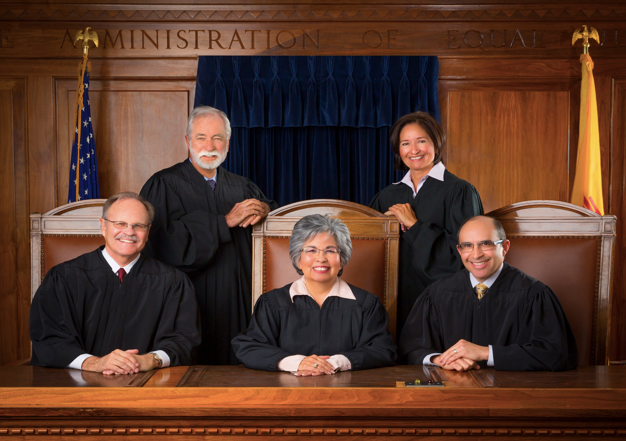By necessity, judicial decrees legalizing same-sex marriage tend to be messy things. Given the issue’s relative novelty, courts are forced to cobble together a few statutes and precedents, borrow some of the more sweeping language from Romer and Lawrence, note that the times they are a-changin’, and leave it at that. Even post-Windsor, a gay marriage ruling is no easy feat; that opinion’s analysis—disparaged as “nonspecific handwaving” by Justice Antonin Scalia—never quite hangs its hat on a single specific constitutional principle.
But with Thursday’s ruling, the New Mexico Supreme Court just raised the bar. In 31 pages of startlingly readable prose, the court brilliantly slays the various rationales for banning gay marriage—themselves a form of nonspecific hand-waving—while elucidating the precise legal doctrines at stake. It matters little that the opinion itself was based on state law; its broader rationale seems aimed directly at the U.S. Supreme Court. Here are some highlights:
The “responsible procreation” argument is utter bunk.
These days, conservatives shy away from arguing that gay people make bad parents, because they definitely, unquestionably, absolutely do not. Instead, the argument has subtly shifted to a new sophism: Marriage laws are meant to encourage “responsible procreation” by opposite-sex couples so that if the woman gets pregnant, the state won’t have an orphan on its hands. The implication, of course, is that gays play no part in this schema, and so it would be absurd to allow them into the marriage club.
Wrong, says Justice Edward L. Chávez, speaking for the court—in fact, New Mexico’s own marriage law makes no mention whatsoever of procreation, exposing the argument’s gesture toward tradition as the claptrap that it is. Instead, “the purpose of New Mexico marriage laws is to bring stability and order to the legal relationship of committed couples … [and] their children.” Plus, “fertility has never been a condition of marriage,” so heterosexual gay marriage opponents clearly aren’t even playing by their own rules. Finally, Chávez drives in the knife:
[W]e fail to see how forbidding same-gender marriages will result in the marriages of more opposite-gender couples for the purpose of procreating, or how authorizing same-gender marriages will result in the marriages of fewer opposite-gender couples for the purpose of procreating.
These points may seem obvious, but the “responsible procreation” argument has gained some ground since it made an appearance before the U.S. Supreme Court last March. Now a court has been fully briefed on the matter, and the verdict couldn’t be clearer: This argument is dead in the water.
Gay people deserve intermediate scrutiny.
For those of us disappointed that the U.S. Supreme Court didn’t use Windsor to specify a level of judicial review for gay people—I confess, I got my hopes up—Thursday’s ruling is a great consolation prize. To review, American courts analyze potentially discriminatory laws differently based on whom they might discriminate against. Laws targeting gender are subject to heightened or “intermediate scrutiny”; laws pertaining to race or religion are subject to “strict scrutiny.” Laws that do not target a vulnerable population must survive mere “rational basis” review, and since most laws make at least some gesture toward rationality, this test is fairly lax.
Irritatingly, the U.S. Supreme Court (in the form of Justice Anthony Kennedy) refuses to settle on an explicit level of scrutiny for laws targeting gay people. Romer, Lawrence, and now Windsor seem to rely on a kind of “rational basis with bite,” which has done the trick thus far. But small, vulnerable populations with a history of discrimination traditionally receive at least heightened scrutiny, so it’s unclear why the court continues to hesitate to apply this standard to gays.
Now, however, the wait may be over. In its analysis, which draws on principles from both the state and federal constitutions, the New Mexico Supreme Court states unconditionally that all laws targeting gay people must be subject to intermediate scrutiny. Gays, Justice Chávez notes, have been “subjected to a history of discrimination and political powerlessness based on a characteristic that is relatively beyond their control.” As a “discrete minority” frequently disadvantaged by majoritarian politics, anti-gay laws clearly merit intermediate scrutiny. And under such scrutiny, laws denying gay people marriage rights and personal liberty must be struck down.
But anti-gay-marriage laws might warrant strict scrutiny.
This point is perhaps the most fascinating in the entire opinion. Traditionally, anti-gay-marriage laws have been analyzed like any other kind of anti-gay law. But Justice Chávez pulls out the marriage question for separate analysis. “Civil marriage,” the court says, “is considered to be a civil right,” and marriage itself may be a special kind of “fundamental right requiring strict scrutiny.” The logic is simple. In Loving v. Virginia, the U.S. Supreme Court clearly labeled marriage a “fundamental right”; now, in Windsor, the court has disallowed the federal government from depriving legally wed gay people of that right. What other conclusion could be drawn from that juxtaposition but that marriage is a unique star in our constitutional constellation, deserving of its own special legal protections?
However, the court ultimately leaves that question for another day—but not without a spot of sass. The U.S. Supreme Court, Chávez notes, has had ample opportunity to decide this issue, but “we conclude from [the court’s] equivocation in these cases that whether the right to marry is a fundamental right requiring strict scrutiny is a question that remains unanswered. … For [these] reasons, we determine that we do not need to definitively answer this difficult question.”
Still, irksome as the continued “equivocation” may be, the New Mexico Supreme Court is probably right to keep the door cracked open on the matter. It is, after all, exactly this kind of “difficult question” that the U.S. Supreme Court is supposed to answer. Until now, the justices have been able to dodge the issue. But after Thursday’s ruling, their equivocation is beginning to seem a lot more untenable.
